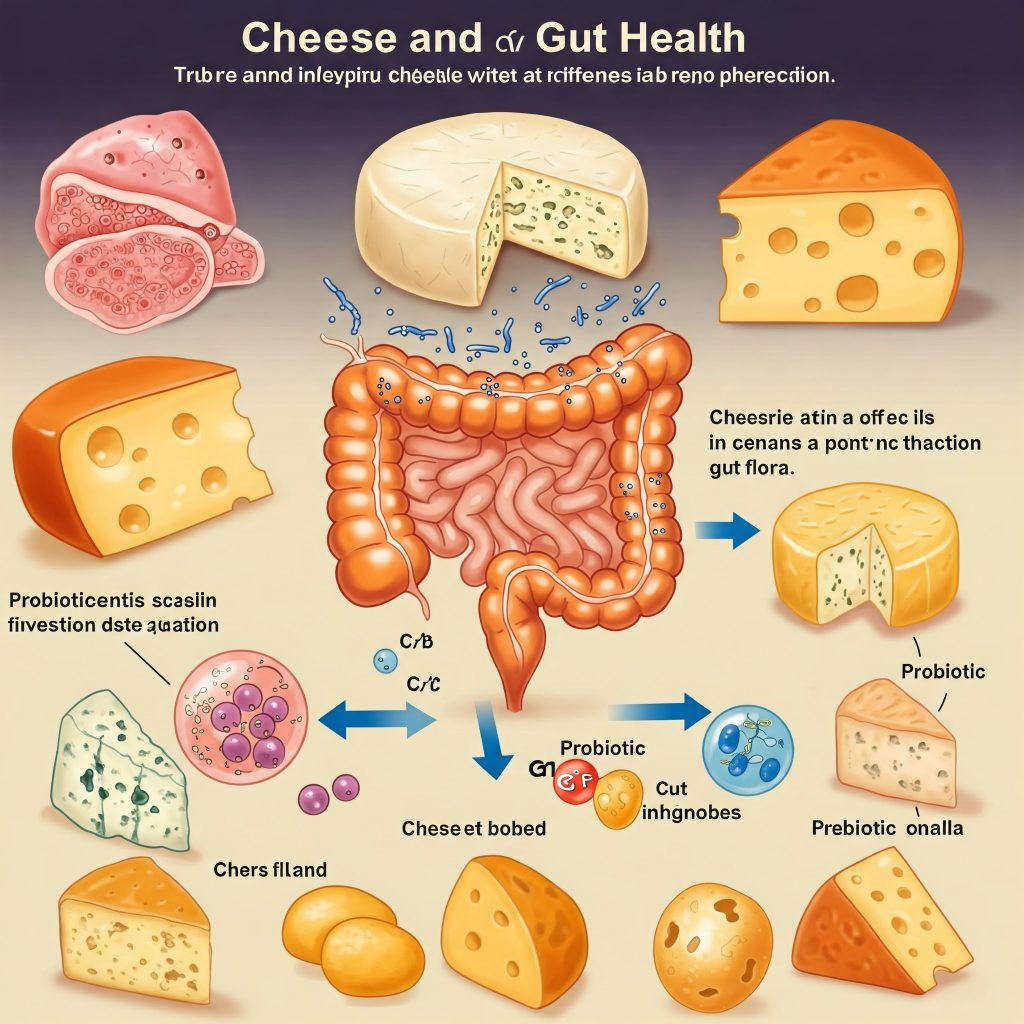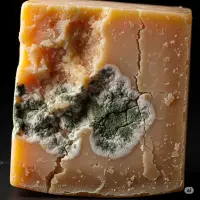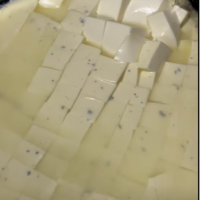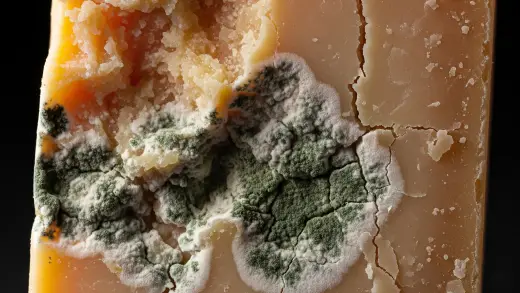If you visit Georgia, you’ll find cheese is a big deal. People there have been making it for a long time, and it’s part of their culture.
You’ll see cheeses like Sulguni, Imeruli, and Guda in their food, especially in dishes like Khachapuri. They use milk from cows, sheep, or goats. You’ll see that making cheese is something they learn from their families.
Cheese! It’s that yummy stuff we love on pizza, in mac and cheese, and even just by itself. There are so many kinds, from the super melty mozzarella to the stinky blue cheese. But did you know that this tasty treat can actually do some surprising things to your tummy?
Yep, it’s true! Cheese can be like a superhero or a supervillain for your gut, depending on a few things.
Sometimes it can be helpful, and other times it might cause some trouble. Let’s dive in and find out how this cheesy goodness affects your insides.

The Gut Microbiome: An Overview
Imagine you have a whole city of tiny little creatures living inside your tummy. These aren’t creepy bugs, though! They’re called the gut microbiome, and they’re super important for keeping you healthy.
Think of it like this:
A Busy City
Your gut is home to trillions of these tiny helpers, mostly bacteria.
Good Guys and Some Not-So-Good Guys
Just like any city, there are some good guys that help keep things running smoothly and some not-so-good guys.
Keeping the Peace
When the good guys are in charge and there’s a good balance, your tummy is happy and healthy.
These tiny residents have some big jobs. They help you break down your food, make vitamins, and even keep the not-so-good guys from causing trouble. It’s like having a little army inside you, working hard to keep you feeling great!
How Cheese Can Positively Impact Gut Health?
You might be surprised to hear this, but some cheeses can actually be helpful for your gut! It’s all thanks to some tiny little helpers hiding inside.
The Power of Good Bacteria in Cheese
Some Cheeses are Packed with Goodies
Certain kinds of cheese, like yummy blue cheese, sharp cheddar, and tasty Gouda, have something special in them called “live and active cultures.” Think of these as tiny, friendly bacteria.
Bringing in the Good Guys
When you eat these cheeses, you’re sending these good bacteria down into your gut. They can join the other good guys already there and help keep things balanced.
Happy Tummy Benefits
These friendly bacteria can do some cool things, like making it easier for you to digest your food and even helping your body fight off sickness! It’s like giving your gut an extra boost of helpful little workers.
Cheese’s Indirect Help: Teaming Up with Other Good Foods
Cheese Isn’t a Big Source Itself
Now, cheese itself doesn’t have a lot of the stuff that feeds these good bacteria (that’s called prebiotics).
But It Can Be a Great Team Player
You can pair your cheese with other foods that do have prebiotics, like crunchy apples, sweet berries, or whole-wheat crackers.
A Winning Combo
When you eat cheese with these kinds of foods, you’re not only getting the potential benefits from the good bacteria in the cheese but also feeding the good bacteria that are already in your gut! It’s like giving them a yummy meal so they can keep doing their important work.
Potential Negative Impacts of Cheese on Gut Health: When Cheese Can Be a Bit of a Troublemaker?
Even though cheese can have some good points, it can also cause some grumbles in your tummy for some people. Here’s why:
The Lactose Factor: Not Fun for Everyone
What’s Lactose?
Cheese has a natural sugar in it called lactose.
Some Tummies Don’t Like It
For some people, their tummies have a hard time breaking down lactose. This is called lactose intolerance.
Upset Tummies
When someone with lactose intolerance eats cheese, they might get stomach aches, feel bloated (like their tummy is full of air), or have other uncomfortable tummy troubles.
Older Cheeses Might Be Better
The good news is that some cheeses that have been aged for a long time, like some cheddars, often have less lactose in them, so they might be easier for some people to eat.
Too Much Fat Can Be a Problem
- Cheese Can Be Fatty: Cheese can have a good amount of fat in it.
- Too Much Can Rock the Boat: If you eat a lot of high-fat cheese, it can sometimes mess with the balance of good and bad bacteria in your gut.
- Everything in Moderation: Just like with many yummy foods, it’s a good idea to enjoy cheese in reasonable amounts.
Processed Cheeses: Not Always the Best Choice
Think Slices and Sprays
You know those super melty cheese slices or the cheese that comes in a can? These are often called processed cheeses.
Extra Stuff Inside
These kinds of cheeses can have extra things added to them, like preservatives and other ingredients.
May Not Be Gut-Friendly
Some of these extra ingredients might not be the best for keeping your gut happy and healthy. It’s often better to go for less processed kinds of cheese when you can.
Choosing the Right Cheeses for Gut Health
If you want to enjoy cheese and also give your gut a little love, here’s what to look for:
Go for the Probiotic Powerhouses
Remember those cheeses with the good bacteria? Keep an eye out for types like blue cheese again, as well as some cheddars and Goudas. These can be a good way to sneak some helpful bacteria into your tummy.
Consider Aged and Raw Milk Cheeses
Sometimes, cheeses that have been aged for a while or are made with raw milk (milk that hasn’t been heated up) can have more of those beneficial bacteria. Just make sure raw milk cheeses are safe to eat, as they might not be for everyone.
Become a Label Reader
The best way to know if a cheese has those good live and active cultures is to check the label! Look for those words on the package. It’s like a secret code telling you there are good guys inside.
Incorporating Cheese into a Gut-Friendly Diet
So, you’ve got your good cheese choices. Now, how do you fit them into your meals to keep your gut happy?
Here’s how to make sure cheese is a tasty part of a diet that your gut will appreciate:
Keep it in Check
Even the good cheeses are best enjoyed in smaller amounts. Think of cheese as a yummy addition to your meal, not the main event. It’s all about finding that sweet spot!
Team Up with Gut Buddies
Cheese loves to hang out with other foods that are great for your gut! Try pairing it with:
- Fruity Fun: Slice some cheese onto an apple or pear.
- Veggie Power: Sprinkle cheese on a salad or roasted veggies.
- Fermented Friends: Enjoy cheese with a side of yogurt or sauerkraut (fermented cabbage). These foods have their own good bacteria that can join the party in your gut.
- Balanced Meal Ideas: Here are some ways to put it all together:
- Lunchtime Yum: Whole-wheat crackers with a slice of cheddar and some grapes.
- Dinner Delight: A salad with crumbled blue cheese, mixed greens, and a drizzle of olive oil.
- Snack Time Success: A small piece of Gouda with a handful of berries.
Conclusion
So, what’s the final scoop on cheese and your gut? It’s a bit of a mixed bag! Some cheeses, like blue cheese, can actually be good for your tummy because of the helpful bacteria they contain.
But remember, it’s all about keeping things in balance. Eating too much cheese, especially the processed kind, might not be the best for your gut.
The key is to pay attention to how your own tummy feels and make smart choices. Maybe try adding some probiotic-rich cheeses to your diet in moderation and see how it goes.
We’d love to hear about your experiences! What’s your favorite cheese, and how does your gut feel about it?















